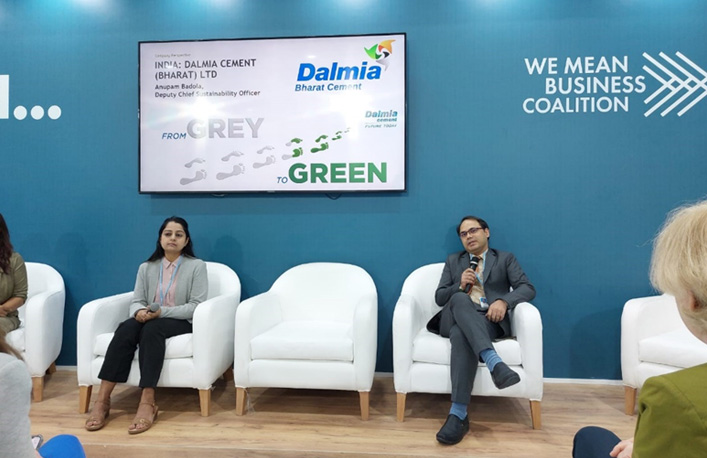Showcasing Business Ambition, Action, and Accountability for Enhanced Policymaking Insights from Germany, Japan, and India

On 11th November 2022 | 09:00 - 10:00 EET
Background and Session Context
At this “Implementation COP” governments and businesses were eager to show their climate ambition turning into action towards a sustainable, 1.5°C aligned transition. However, governments often lack the evidence to support policy decisions, while businesses depend on supportive policies to realize their net-zero transition plans.
The deliberations brought policy makers and businesses together in a crucial, interactive discussion on how evidence from the real economy can help translate NDC ambition into effective strategies and policies. Evidence and insights drawn from thousands of businesses reporting to CDP combined with consultation of leading businesses were showcased, along with targeted policy recommendations - focused on the clean energy transition in Germany, Japan and India. The event was jointly organised by TERI, CDP, We Mean Business Coalition and Stiftung KlimaWirtschaft.
Summary of Discussions
Opening Remarks
Pietro Bertazzi, Global Director, Policy – CDP, highlighted the importance of transparency and the role of data in enhancing transparency. Proceedings on the Global Stocktake, and strengthening the enhanced policy framework were some of the key elements that would truly make this COP, the implementation COP27. He further added, that Finance Day saw discussions around data, where ESG data providers called for more (data) through mandatory corporate disclosures, and better data. It is important to allow comparisons that can be analysed well, but the data needs to be robust equally.
The question that the session sought answers for are: How can governments utilize the data for evidence-based decision making? Governments often miss the evidence that comes from companies to make policies that help push the agenda of the Paris Agreement. Simultaneously, many businesses that are setting science-based targets, and are disclosing information are missing enabling policy environments that allow them to go further ahead. The Ambition Loop project aims to enhance the ambition of the companies and can push companies to go far further with their actions.
Sophie Punte, Managing Director of Policy at We Mean Business Coalition described the concept of Ambition Loop Interface. On one hand, business leadership and ambition of businesses in terms of climate targets (SBTi target, net-zero targets) require policy support and on the other hand, governments need to translate NDCs into practise but need businesses to help them do it. The vision of the concept is to use CDP which is currently primarily used for investors and can be used to support policy making. For example, in Germany 20% of energy by companies is from renewable energy while Japan has only 4%. There is a need to link company data to policies which will ultimately help governments to improve policy making. Therefore, there is a need for an interface to bridge the data and policies. This would ultimately help businesses and policy makers.
During his address, Mahendra Singhi, Managing Director and CEO of Dalmia Cement (Bharat) Ltd. said “Our vision, commitments and work with partners, CDP and We Mean Business and TERI has resulted into ambition, actions, accountability, and I use the word admiration. The Indian government also needs admiration as they are changing mindset, policies. Ambition can drive company, sector and country. If we start visualising future, we can do more.”
“Dalmia was the first one to become net-zero cement company and net-negative cement company. At COP24, much ahead of announcements of net-zero targets, Dalmia cement had committed to become net-negative by 2040. This has helped us to think more and act more. The accountability will come from sharing the data. The concept will go a long way in creating confidence among businesses and policy makers”.
Insights from Germany:
Mona Freundt, Assistant Director of Policy and Partnerships at CDP explained the key areas of focus for business analysis which rely on disclosures, ambition, transition and energy. CDP analysis on business ambition provided in-depth information of companies setting science-based targets (SBTi) and their target alignment to a 1.50 temperature pathway. CDP analyses companies’ transaction plans across 24 indicators. While in Germany 42% of companies report they have a transition plan, only 1% report on all the indicators that are deemed important by CDP. On the energy front, only half of the CDP companies report on energy use and only 20% of them have low carbon energy target.
Ronja Busch, Advisor for European International Policy, Stiftung KlimaWirtschaft explained the business highlights from the consultations. The organisations based in Germany have indicated the key pillars which are helping them in their climate ambition, and these are: clear and reliable target setting, carbon pricing (EU-ETS with planning security, putting a price on carbon helps companies to take decisions and renewable energy regulation). The RE regulation in place is helping companies to have access to renewable energy and expand renewables. Permitting procedures take long for power grid companies, for industrial plans and for EU funding. Lead Markets for green products, standards for green cement, and green steel are required.
Erika Mink-Zaghloul, Head of Government Affairs, Thyssenkrupp Steel Europe AG explained how enhanced climate ambition for large companies translates to strategies and investment plans. During her remarks she said: We have a climate transition [pathway] to become carbon neutral. Direct reduction plant with coal-based blast furnace through hydrogen direct reductions which will reduce 20% of current emissions by 2025. The first plant will be operated in 2026 and second for this technology by 2030.
She reiterated the significance of reskilling and capabilities of the workforce to carry out low carbon transition. She highlighted the need of a supportive regulatory framework from the German government and European Union to de-risk the investments in green hydrogen and building green energy infrastructure. She also reiterated the role of energy partnerships between countries and standards for green products. She also introduced the concept of climate clubs where decarbonisation roadmaps for steel companies could be shared between countries which will facilitate dialogue and exchange on effective policy tools.
Insights from Japan:
Moka Yamagata, Project Manager, CDP Japan shared the insights from organisations reporting CDP data in Japan. She mentioned that while 43% of companies have climate transition plans only 1% have reported on all the indicators. There are 72 RE100 members in Japan and only 18% of companies have RE targets. The Japanese government has committed to be net-zero by 2050. Japanese government is promoting ammonia co-firing with coal. She highlighted the significance of energy certificates and role of market mechanisms to support organisations to increase the uptake of renewables in their respective portfolios.
Megumu Tsuda, General Manager Sustainability Promotion Division shared the aggressive targets of Hitachi for carbon neutrality in 2030 and 2050 and the inclusion of Scope 3 emissions in their low carbon transition plans. Hitachi is a global solution provider in renewables and has plans to invest 4 billion USD in the near future on low carbon technologies. In Japan, Ministry of Energy, Trade and Industry has started an initiative of green transformation and 500 companies joined discussions on new and clean technologies. She highlighted the significance of global dialogues in helping companies move faster for climate ambition and accelerating the pace of low carbon transition.
Insights from India:
Prarthana Borah, Director, CDP India highlighted the growth of Indian companies on target setting with over 100 companies setting Science-based targets and 43 companies' near-term targets approved. In terms of energy targets, only 4% is from renewable energy sources reported by 81 companies. She highlighted the significance of sectoral pathways.
Taruna Idnani, Project Manager, TERI, shared the significance of enhancing the climate ambition. She provided insights on how India’s climate leadership and targets have helped the country to achieve its commitments of Paris Agreement. India has a positive story of renewable energy in the country and it has developed robust energy markets. She highlighted the correlation between India’s updated NDCs and the exponential increase in climate ambition by companies in terms of committing to Science Based Targets (SBTi). The next emphasis is on supportive policies for industry transitions which will help organisations to implement low carbon technologies.
Anupam Badola, Deputy Chief Sustainability Officer at Dalmia Bharat Group laid emphasis on the significance of global developments. Dalmia Bharat Group have aligned their low carbon strategies with global developments. At COP24, Dalmia Group announced their net-zero targets and increased their ambition way ahead of others.
Massive investments have been made in clean energy, use of alternate fuels and clean fuels. A couple of years back, the thermal substitution range of alternative fuels was 3-4% but has now increased to 40% in some plants. However, the company can achieve more if more conducive policy environment is created. For example, currently there is 26 million ha of degraded land in India that can otherwise be used for production of sustainable biomass that can be used as an alternative fuel to coal and pet coke in the heavy industry. Further, there is a need to rationalize transmission charges for renewable energy to help enhance the capacity of renewable energy in the country and drive efficiency gains.
Birgit Schwenk, Head of Department Climate, Federal Ministry of Economic Affairs and Climate Action, spoke about the efforts of Germany in engaging with the “Industrial Decarbonization Agenda”, an initiative led by the United Kingdom. As part of the initiative, the International Energy Agency (IEA) and other organizations were invited to share tools within the energy sector relating to demand, procurement rules. As part of another IEA study initiated on standards and definitions surrounding the green economy, one of the important points emerging was the essence of data, corporate sustainability disclosures and the role of definitions and labels. With the initiation of this study, talking points about the methodology of what is “green” have begun, and initiatives such as the Industrial Deep Decarbonization Initiative (IDDI) and the First Movers Coalition, can benefit from clear and scientifically-defined sustainability –related labels.
Key Messages:
- Governments face key challenges in developing and effectively implementing NDC strategies due to limited political capital, capacity, and inability to engaging businesses in a meaningful way
- Businesses face challenges in setting 1.5-aligned SBTs (Science Based Targets) and developing and implementing net-zero transition plans. They need supportive policy but have difficulties engaging with governments in a responsible and collective fashion.
- The deliberations showcased how scaling ambition loops through evidence and insights from forward-looking businesses can translate NDC ambition into strategies and policies in the energy transition. Specifically:
- Disclosure by companies to CDP can give substantive business evidence on ambition, action, and accountability at the global, country and sector levels
- Businesses can articulate what policies helped and hindered their ambition and action, and point to policy opportunities within their countries or sectors
- Business evidence and insights can be used to support governments to strengthen policy that in turn will improve business performance (‘ambition loop’)


To Watch The Event:

